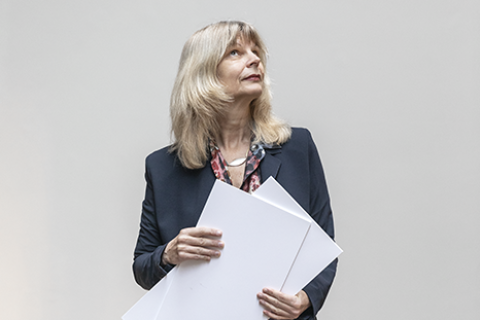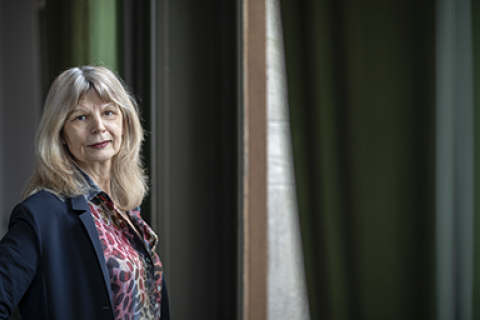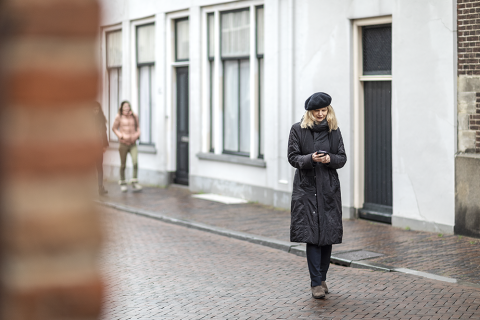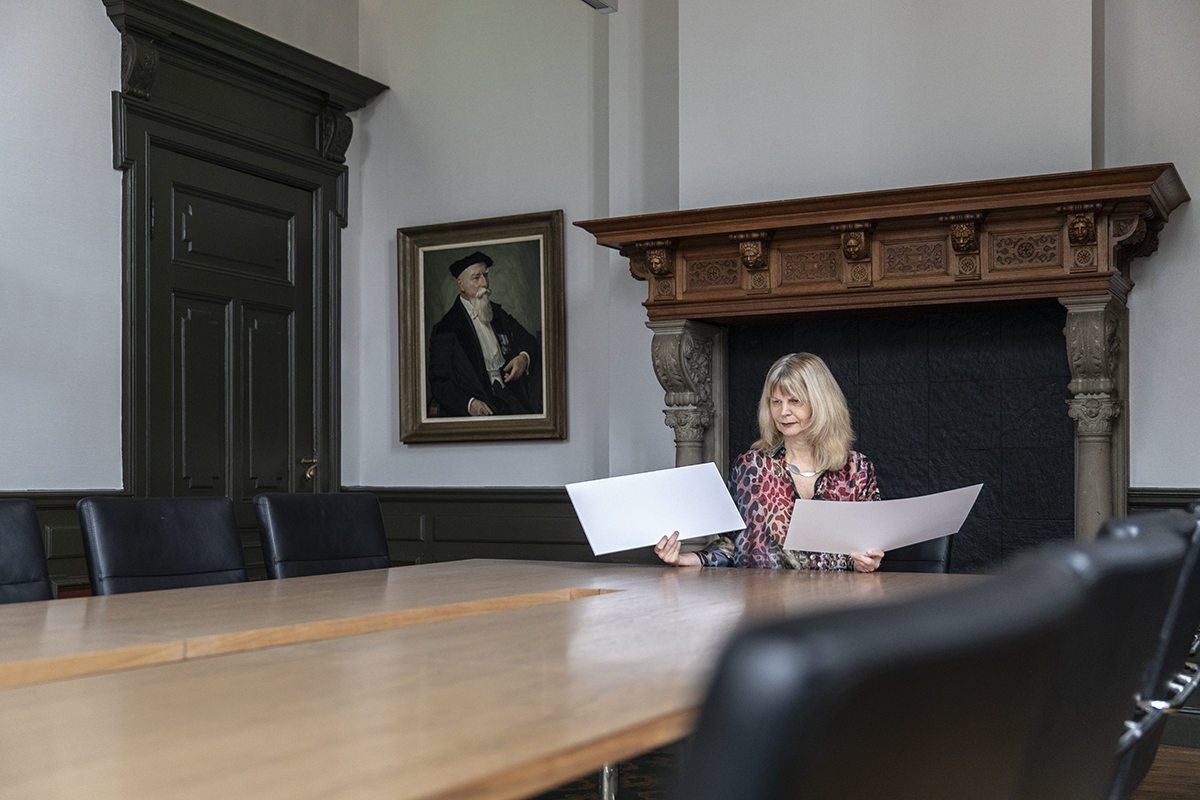What is true?
Facts about fake news

‘Fake news!’ the 45th President of the United States constantly cries — especially when the media report something that doesn’t suit him. What’s the story there? Do facts no longer exist, or do they no longer matter? What role do social media play in the apparent fall from grace of serious news reporting?
University professor and alumna José van Dijck on the issues.

We meet in a stunning building on Achter de Dom, where the University’s distinguished professors have been given a space of their own. ‘In 1987 I left for the US to do my PhD in Literature. But it turned out that the university had a very good Communications department. That was still a fairly new discipline in the Netherlands at the time, and one that I became increasingly interested in,’ says José van Dijck, looking back on her career trajectory from being a student of Dutch and General and Comparative Literature at Utrecht University to becoming Professor of Media and Digital Society at the same institution. Her personal journey mirrors the shift that has taken place within the humanities, where subjects such as communication, media and information (including digital media) — with their significant social implications — have become an increasingly important area of study. ‘Fake news’ is one such example of a topic that has huge relevance for society.
Facebook is the biggest distributor of news in the world.
Returning to her alma mater as a professor after almost thirty years has turned out to be a surprising experience. ‘After graduating in Utrecht, I did my doctorate at the University of California, San Diego, before coming back to the Netherlands to teach and do research. I was appointed to Utrecht University in early 2017. I found it surprising how, after such a long time, I’d still run into people that I know from my student days on a regular basis. I like that — it feels like coming home.’
But what’s the story with fake news? Isn’t news produced by serious journalists rather than by Facebook; journalists who, as a rule, pride themselves on getting as close to the truth as possible? Isn’t Facebook just a social network where regular people can get things off their chest and engage in innocent chitchat?
Van Dijck: ‘It’s true that Facebook does not produce its own news like newspapers or TV channels, but it is a distributor of news. What Facebook does is bring together users, content and advertisers. And there are many people who consume news via this platform — in the US, nearly 40 per cent of news consumers get their information on current events from their Facebook newsfeed. That makes Facebook the largest distributor of news in the world — yet for a long time one that didn’t consider itself responsible for filtering fake news or hate speech. Following a significant societal and political backlash, they have started hiring editors that are supposed to eliminate misinformation. But Facebook also has a commercial interest — getting as many clicks and hence ad views as possible.’
Especially in the context of populism, confirmation bias plays a strong role.

According to Van Dijck, it is mainly older people who believe that news is exclusively produced by serious journalists. ‘They’re used to going straight to the source — to the outlet that published the news in the first place. That outlet already tells you a lot about how seriously to take the news. Readers know that NRC Handelsblad is a different kind of newspaper than De Telegraaf. That context is often lacking on the internet, making it difficult to establish the reliability and objectivity of information. We call this phenomenon “context collapse”. If news, gossip and rumours are all offered alongside each other, consumers no longer know what to believe and what not to believe out of that hotchpotch,’ Van Dijck says.
Is there anything we can do about that? Is it possible to add context to the information on Facebook and other digital media so that readers are better equipped to judge the reliability? Van Dijck is pessimistic: ‘People are definitely trying to do this. All sorts of initiatives are underway to make sources more transparent, check facts and expose fake news. Right now it’s not clear who is responsible for disinformation. At the EU Level, the High Level Expert Group on Fake News and Disinformation (headed up by UU professor Madeleine de Cock Buning, see page 27) has looked into this question, but many private individuals were afraid that the state would end up deciding what is and is not allowed on the internet, which gets awfully close to censorship. But you also don’t want to give commercial players complete freedom in this area. Letting citizens’ organisations do the filtering is definitely an option, but is that really going to be enough? Safeguarding the quality of news is harder than it seems at first glance — it’s a shared responsibility and one that we have to figure out how to deal with in the changed media landscape.’
According to Van Dijck, there’s also a significant portion of the population that doesn’t care whether or not something is fake news. ‘Traditional media regularly conduct fact checks. But many citizens aren’t interested in the facts; they’re mainly looking for confirmation of their own views or preju-dices. “Confirmation bias” is what we call that. That attitude is especially prevalent in the context of populism. It doesn’t really matter whether it’s fake or not — we’re calling it fake because it doesn’t jive with our idea of the truth. And by calling something fake, at the same time you’re implying that what you’re saying is not fake. So when Trump goes on about how the New York Times, CNN and all the other mainstream media can’t be trusted, he’s also saying that he can be trusted.’

‘The worst thing about that is that it undermines people’s confidence in institutions,’ Van Dijck continues. ‘Journalism can no longer be trusted, the judiciary can no longer be trusted, and science, too, is “just an opinion”. I think the only thing we can do is continue to strengthen the institutional checks and balances through transparency, peer reviews, issuing corrections, judicial review, ensuring both sides are heard and so on. Open institutions are the bedrock of our society. I’m very glad that this is one of Utrecht University’s four strategic research themes.’
There’s plenty of research to be done in this area. But what about the role of education? You once said media literacy should form a core part of university education. ‘Of course the internet offers a wealth of information, but it’s not always easy to navigate. A lot of the time people will do some googling and then believe that their knowledge is on a par with that of actual scientists,’ Van Dijck fears. ‘They think they know better than doctors whether vaccines are necessary, or whether or not the polar caps are melting as a result of carbon emissions. We need to teach our children and students that informa-tion is not the same thing as expertise.
‘Information can be easily found on Google, but expertise requires that you are able to assess that information, filter out non-sense, and distinguish between facts and options. Media literacy is an impor tant issue. Children shouldn’t just learn how to search for information online and use sources in a critical way — they also need to learn to judge and assess them. And of course they need to know the potential impact of social media on behaviour, for example when it leads to addiction or bullying. Educational institu-tions definitely have a role to play there.’
This is borne out, Van Dijck says, by the shift that has taken place in the humanities and by her own career trajectory. ‘When I started studying Dutch at Utrecht Univer-sity, there were 300 first-year students in the pro-gramme. About half of them ended up working in communications or for the media. That’s where the jobs were, but there were still very few degree programmes in that field at the time. They do exist now, and the popularity of language degrees is waning as a result — the number of first-year Dutch Language and Culture students is only a fraction
of the 300 there were back then.’
A growing share of social interaction takes place via online platforms.
Van Dijck considers it self-evident that social media is a hugely important topic for academics. ‘We have more and more platforms at our disposal that control our entire lives. Notionally, we no longer need to read the paper to stay informed about current affairs, we no longer need schools to acquire knowledge, we no longer need travel agencies to book flights, and so on, and so forth. From Airbnb to Uber, from Nextdoor to Facebook — a growing share of social interaction and economic transactions take place directly through these kinds of platforms. This is what my most recent book is about. The public’s perception of those platforms is overwhelmingly positive. People feel they lead to less overhead and less government interference; nowadays we can take care of everything ourselves on our laptops or smartphones. But what people fail to realise is the impact of these platforms on the public interest.
The Big Five — Google, Apple, Facebook, Amazon and Microsoft, collectively known by the acronym GAFAM — provide virtually all the infrastructure for these platforms and by doing so are organising our entire society. That means those companies have tremendous power over our society. Yet they are all based in the US and their business practices reflect American values. Take their approach to govern ment intervention, for example — privacy laws barely exist in the US. In Europe, on the other hand, we feel the need to see our public values reflected in these platforms; we are less averse to government regulation. We want guarantees for the accessibility of news, for safety, data privacy, a fair playing field and trustworthiness. Various measures have already been implemented to this end, such as the General Data Protection Regulation and the fines imposed on Google for violating antitrust law. But it’s very tricky to safeguard public values effectively in a society that is characterised by these kinds of online platforms. Both the public sphere and the academic community have quite a challenge on their hands.’
José van Dijck studied Dutch and General and Comparative Literature in Utrecht and obtained her PhD at the University of California, San Diego with a thesis on scientific communication. In 2001 she became Professor of Media Studies at the University of Amsterdam. Between 2015 and 2018 she was president of the Royal Netherlands Academy of Arts and Sciences. On 1 January 2017 she became a professor at Utrecht University, where she does research on the digital society, social media and media technologies. Her most recent book, The Platform Society (2018), co-authored with Thomas Poell and Martijn de Waal, explores the battle for public values in an online world.
Text Armand Heijnen
Images Ed van Rijswijk
This article was published in alumni magazine Illuster (March 2019). Illuster is published two times a year and sent free of charge to all alumni with a known postal address in the Netherlands.

